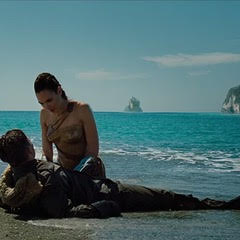
Ever notice how beaches have “runs” of marine life washing ashore? One week it’s conch shells, the next it’s jellyfish. Lately, I’ve experienced a run of my own — friends, colleagues, students, all struggling to pinpoint their inciting incident.
Quick refresher: The inciting incident is the event that triggers the action of your story’s plot. Sometimes, it’s big and dramatic—in last year’s blockbuster Wonder Woman, it comes when a World War I pilot crashes into the sea and is saved by Diana, Warrior Princess of the Amazons. Sometimes, it’s small and seemingly ordinary—two people get married, a family moves into a house that is rumored to be haunted, a new college graduate accepts a job.
Sounds obvious, right? Not so much. In the thicket of your own story, it’s easy to get lost.
Here are a few common ways writers go wrong:
- It’s super dramatic, so you’re saving it for last, for a Big Finish. Whenever you try to hold back something “good” so you’ll have a plot twist or flashy ending later, you’re going to tie your story into knots. Trust yourself to write those later moments in a compelling way, and put your inciting incident where it belongs.
- You buried it because you moved your climax to the beginning, for a more dramatic opening. My colleague Susan Breen says many writers make this mistake because they’ve been told so often that their story must hook the reader immediately. That’s absolutely true, but it’s like starting Hamlet with the final duel/bloodbath, and then trying to end with Hamlet meeting his father’s ghost. Hooking the reader doesn’t mean setting off explosions—it means start at the beginning and use your craft to make it interesting.
- Every plot point seems like it could be an inciting incident. The writer Peter Selgin recently wrote about this over at Jane Friedman’s blog: An inciting incident lurk(s) behind every inciting incident, a breadcrumb trail of inciting incidents leading back to the birth of the protagonist and beyond… If your story has more than one, look again. Are you cramming three stories into one? Are you starting your story too early? Remember, Casablanca doesn’t start with Rick and Ilsa meeting in Paris, nor when they moved to Paris, nor with their parents getting married. It begins on a seemingly typical night in Rick’s Café Américain.
- Recognizing the true inciting incident of your story might require you to let something else go. If you find yourself thinking, “Oh I can’t cut that, that’s my favorite,” maybe you should think again. Throw a Golden Lasso around that inciting incident and squeeze. If it’s not telling you the truth, maybe it should wait for the sequel.

Kelly Caldwell
Dean of Faculty


